Published: 2025-05-16
Hong Kong Baptist University’s Department of Communication Studies and the University of Georgia’s Crisis Communication Think Tank (CCTT) have launched the Asia Hub of CCTT, marking a major milestone in crisis communication research across the region. The official announcement was made at the Inaugural Symposium on AI and Cyberattacks on May 9, 2025, where experts gathered to discuss the evolving challenges in issues and crisis management. The think tank aims to foster dialogue and collaboration between leading crisis communication scholars and practitioners across the U.S., Europe and now Asia.
A Centre for Crisis Communication Excellence in Asia
This new initiative, co-organized by HKBU’s Department of Communication Studies and the Hong Kong Polytechnic University’s Department of Chinese and Bilingual Studies brings together scholars and industry professionals to foster interdisciplinary research, strategic dialogue, and collaborative engagement.
“With the CCTT Asia Hub now fully operational, scholars, policymakers, and industry leaders are set to benefit from cutting-edge research and strategic collaboration,” says Bu Zhong, Dean of HKBU’s School of Communication. “As AI continues to shape global communication practices, the Hub is poised to play a crucial role in advancing crisis management strategies across Asia, ensuring organizations are better equipped to respond to emerging challenges”.
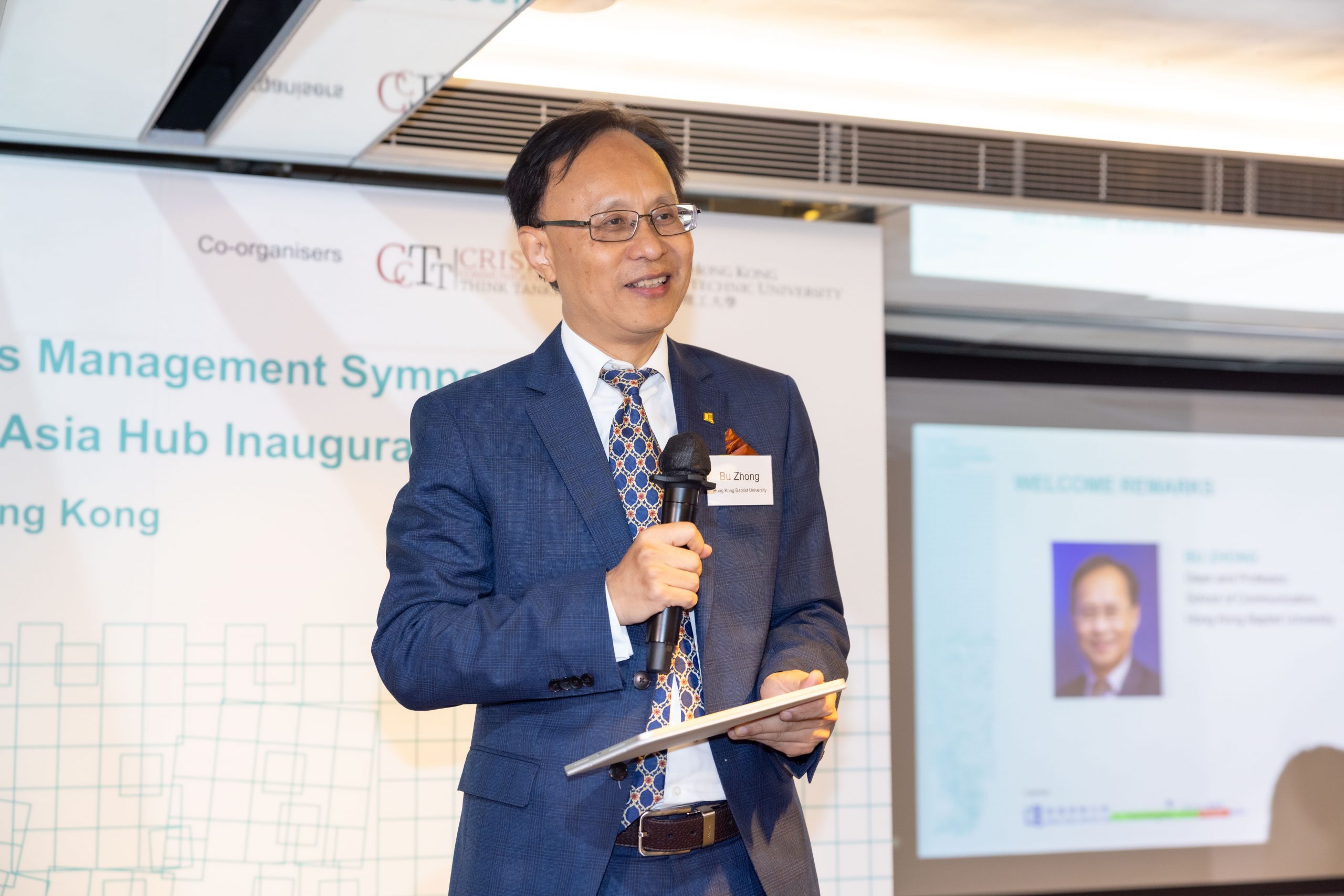 |
Bu Zhong speaking at the symposium |
Regina Chen, Professor and Head of the Department of Communication Studies, emphasized the strength of the department’s expertise in the field of crisis communication. She noted that the department is renowned for its comprehensive research and integrated curriculum in public relations, advertising, and strategic communication, particularly in the era of Artificial Intelligence.
“As the oldest communication department in Hong Kong, we are proud to leverage the resources of the newly developed AI Media Centre at the School”, Chen remarked. “Our strong reputation for academic excellence, interdisciplinary collaboration, thought leadership, and industry relevance has positioned us to effectively manage the CCTT Asia Hub”.
The establishment of the CCTT Asia Hub represents a significant expansion for CCTT, which is internationally recognized for its leadership in crisis communication. The CCTT, headquartered in the Grady College of Journalism and Mass Communication, was established in 2018 with the objective of building collaboration among crisis scholars and practitioners. Established in 2023, its International Hub is co-hosted by the Amsterdam School of Communication Research at the University of Amsterdam.
With Asia’s rapidly evolving communication landscape, the latest expansion of CCTT in the continent aspires to serve as a reliable resource for organizations seeking expert guidance in crisis management. Its objective is to drive crisis communication knowledge via academic-practitioner collaborative research within Asia and globally.
Advancing AI-Driven Crisis Management
The symposium, titled, “Facing AI and Cyberattacks: Navigating Challenges and Seizing Opportunities for Crisis Resilience” convened scholars, industry leaders, and communication experts to examine AI and cybersecurity driven crisis challenges. Discussions focused on the transformative potential of AI systems in crisis response, emphasizing their ability to enhance strategic decision-making and resilience in an increasingly digital landscape. Moreover, when managing cyberattacks organizations must adopt a holistic approach integrating management of third-parties, legal and the human aspects of a business.
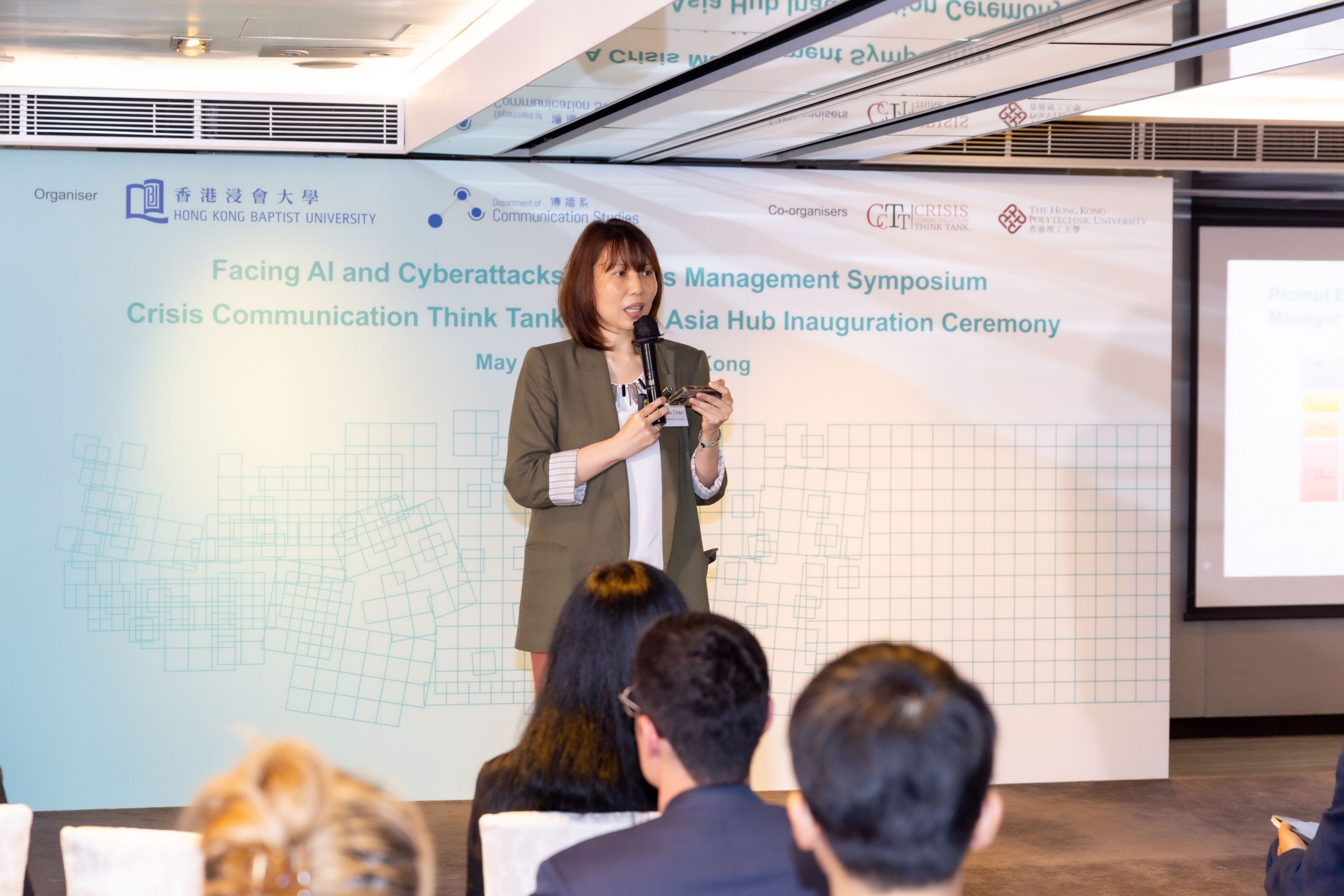 |
Regina Chen speaking at the symposium |
In her presentation titled ‘Utilizing “AI Agent” in Issue Management: A Five-Step Flow and its Effectiveness, Regina Chen expounded on how agentic AI systems, defined by their autonomy, agency, and goal orientation, can revolutionize corporate issues management. She and her collaborator, Anfan Chen, Research Assistant Professor in the Department of Communication Studies, developed a five-step AI issue management system on the Coze platform. The process includes issue data collection, issue knowledge understanding and summarization, initial strategy formulation, cross-LLM evaluations and suggestions, and finalizing issue management responses. Findings from the study reveal that Agentic AI-generated issues management strategies and responses align closely with expert evaluations, indicating AI’s effectiveness in helping corporations navigate issues.
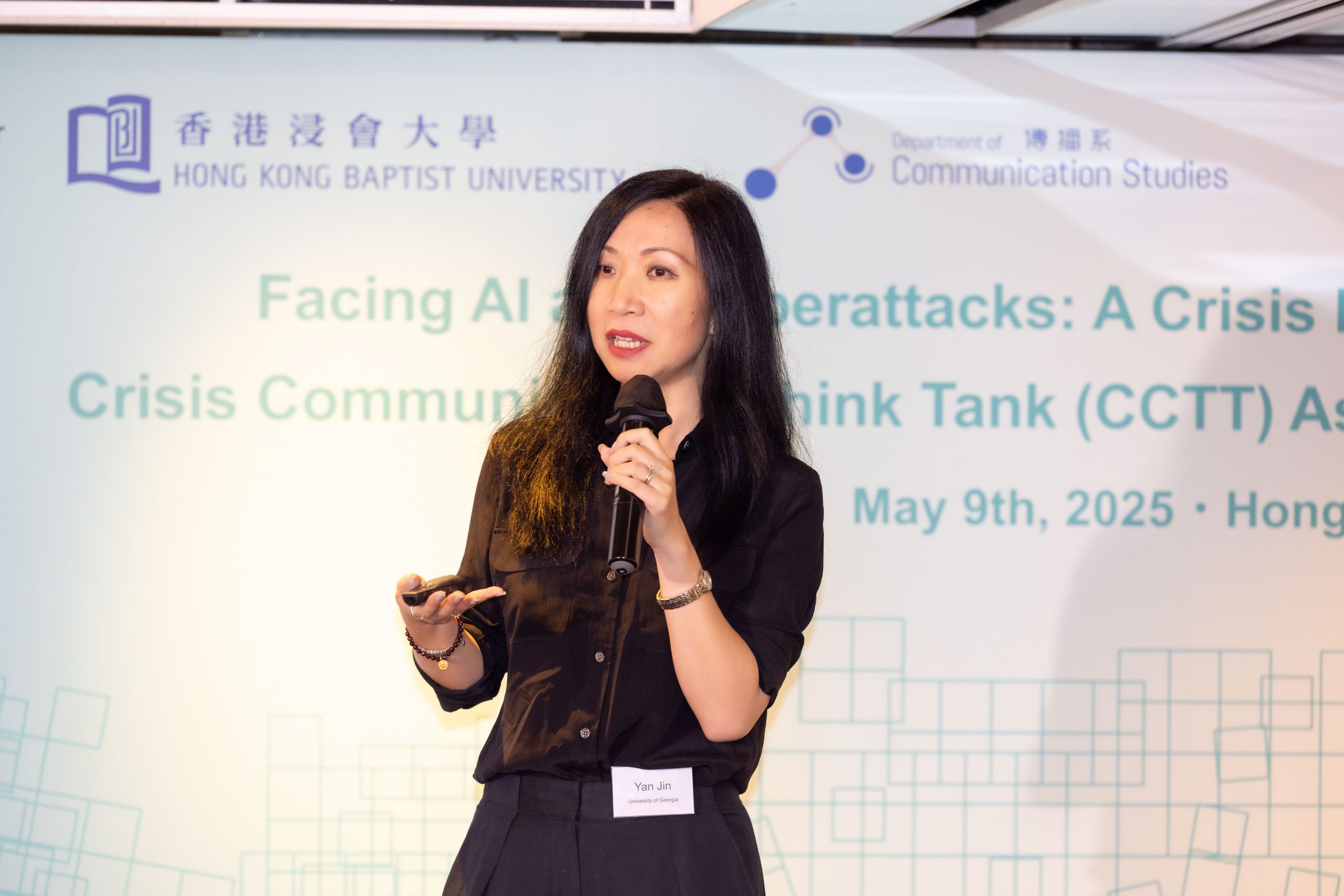 |
Yan Jin speaking at the symposium |
Yan Jin, Professor at University of Georgia and Director of CCTT, corroborated Chen’s submission about the transformative potential of AI in crisis communication. Her presentation titled ‘LEAP into Technological READINESS: A New Framework for Managing AI-triggered Sticky Crises’ explored how digital innovation and technological advancements have reshaped the informational ecosystem within social-mediated crisis communication. Jin argued that that the READINESS model, grounded in academia-industry collaboration and interdisciplinary co-creation, offers organizations a fresh approach to enhancing competency at individual, team, and executive levels. She further noted that it cultivates a collective mindset characterized by adaptability, courage, and creativity, while fostering a human-AI integrated culture for dynamically managing issues, risks, conflicts, and crises.
Building Resilience against Cyberattacks
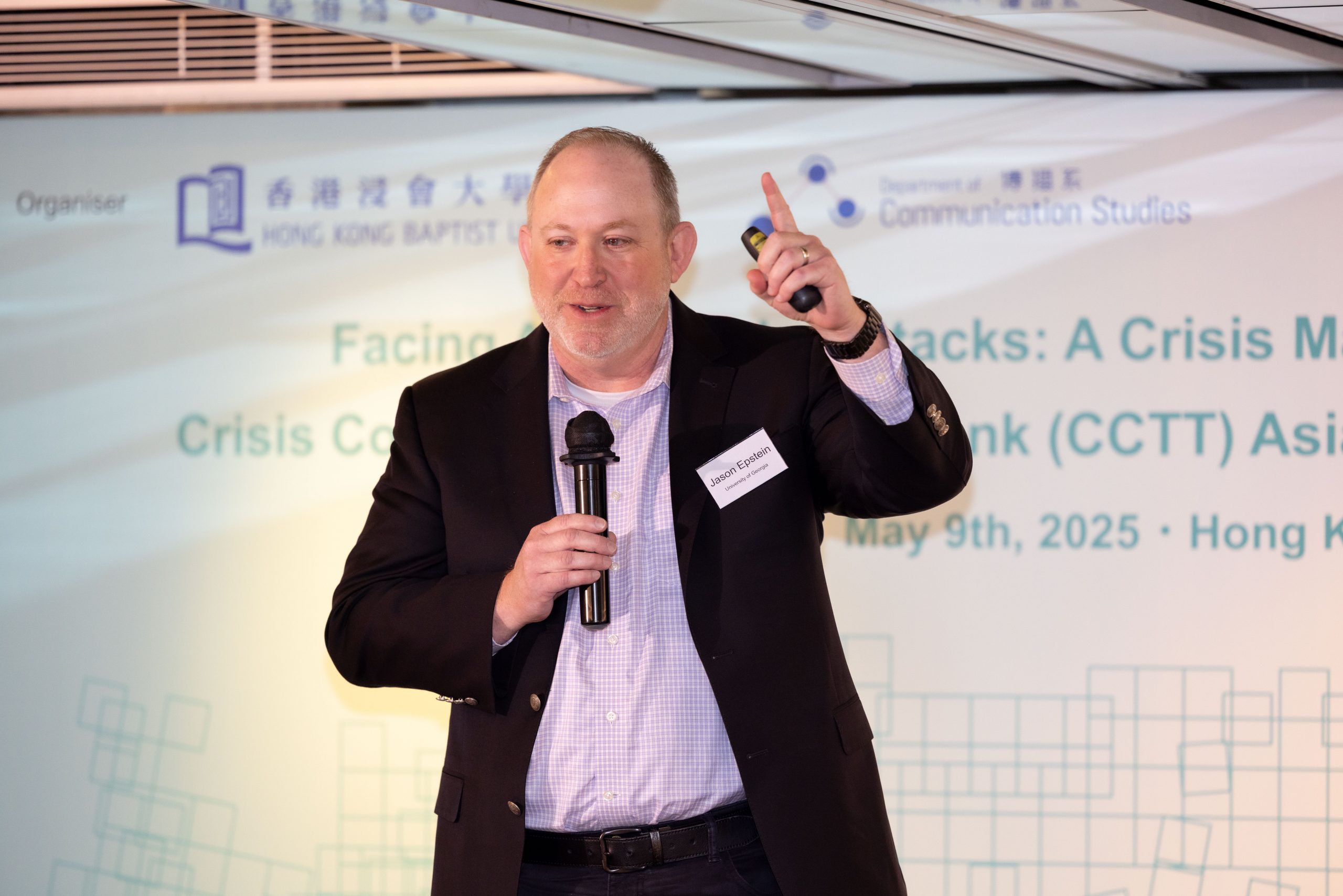 |
Jason Epstein speaking at the symposium |
Cybersecurity threats are becoming increasingly sophisticated, exploiting the vulnerabilities in the systems of organisations and companies. Jason Epstein, Lecturer at Terry College of Business, University of Georgia, and a Core Partner of CCTT, examined the issue through the lens of legal risk, encompassing compliance, liability, contractual obligations, and policy considerations, all of which come into play when an attack occurs. In his talk on ‘Legal Risk in Cybersecurity: Navigating the Complexities’, Epstein noted that third-party vendor may sometimes introduce vulnerabilities while organizations invest heavily in securing their infrastructure. He further argued that even when a breach originates with a vendor, the affected company is often held liable, with indemnification and insurance providing only limited protection, particularly when reputational damage becomes the primary concern.
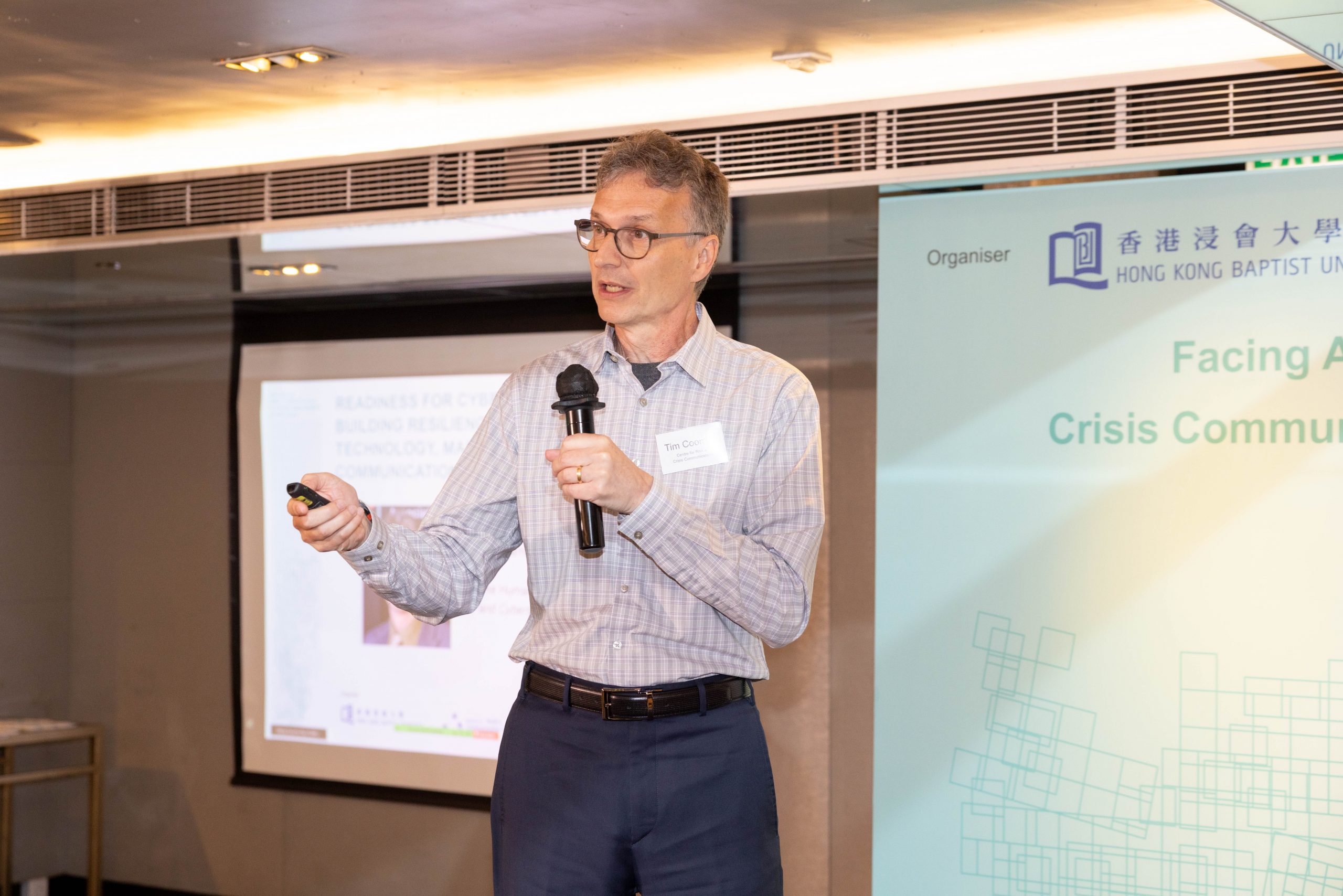 |
Tim Coombs speaking at the symposium |
Tim Coombs, Advisor at Centre for Crisis and Risk Communications and a CCTT Member asserted that cybersecurity failures present a distinct challenge for organizational crisis managers. His talk on ‘The Human Side of Cyberattacks and Cybersecurity’ highlighted the implications of human-driven cyberattacks. Coombs emphasized that most cybersecurity breaches stem from human failures, particularly social engineering tactics. He further noted that stakeholders often hold the affected organization accountable for such incidents, which can result in a significant number of potential victims.
Other industry experts at the symposium also highlighted some strategic approaches to strengthen resilience against cyberattacks. David Ko, Asia Managing Director of Ruder Finn Interactive, discussed AI-powered decision intelligence in his talk, “AI-Enhanced Decision Intelligence: Leveraging Advanced Tools for Crisis Response.” He outlined how platforms like EchoLocate, BRAND Watcher AI, and SONAR enable organizations to navigate high-pressure situations by offering real-time monitoring, predictive analytics, and scenario planning. These advanced tools help businesses make faster, more informed decisions during crises. Alan Lee, Partner, Financial Services, Cybersecurity Consulting, Ernst & Young Advisory Services Limited, in presentation on ‘Mitigating the Third-party Cybersecurity Risk’ underscored the importance of understanding the cybersecurity risk landscape and industry best practices to effectively mitigate third-party cybersecurity risks throughout their lifecycle. He also underscored how collaboration with third parties enhances operational efficiency and agility.
This inaugural symposium set the stage for further groundbreaking research, knowledge exchange, and innovative solutions in crisis communication in Asia.
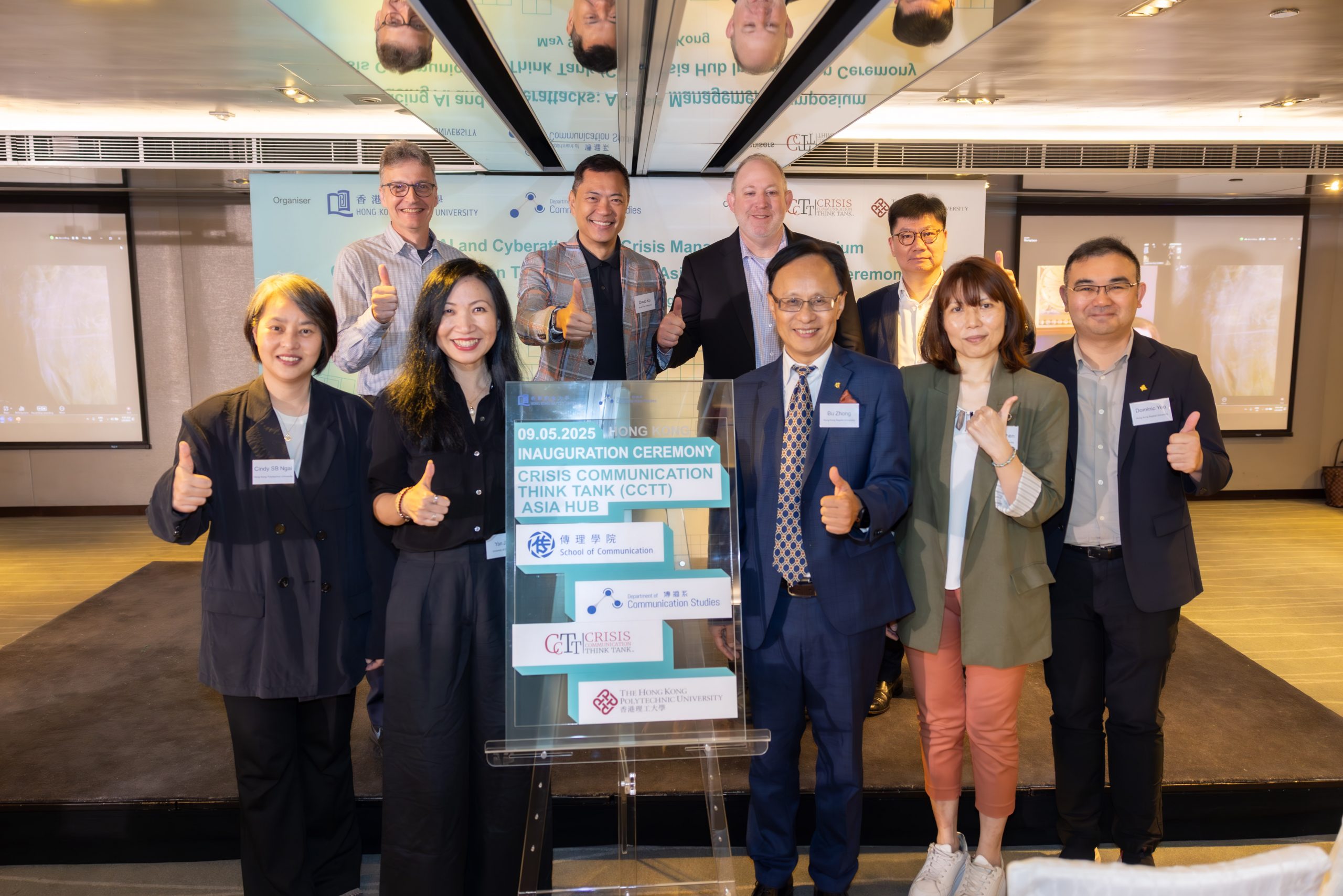 |
Speakers at the symposium |